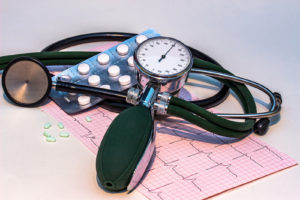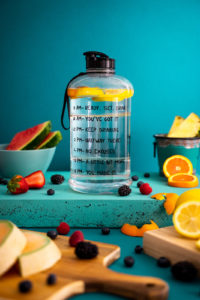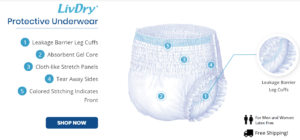Avoid These 5 Habits to Maintain Healthy Kidneys
Written by tyemedical on Apr 17th 2020
It’s National Kidney Month, and your Tye Medical team is shining a spotlight on these small, fist-sized organs. Most of us take healthy kidneys for granted, at least until a problem arises. But your kidneys work very hard every day to keep you well. Did you realize that each of your kidneys contain about a million tiny filters used to process approximately 40 gallons of fluid each day (enough to fill your home’s hot water tank)? Unfortunately, you can unknowingly sabotage their efforts and cause permanent damage.
If you want to stay proactive, it helps to have a basic understanding of how your kidneys function and ways to keep them working at optimal levels.
What Do Kidneys Do?
Your kidneys filter the blood that flows through your body, casting out what’s harmful or unnecessary while preserving nutrients, water, and other things you need. In the process, waste and excess fluids are filtered out of the blood and become urine that’s eventually excreted through the bladder and urethra. In short, kidneys are the gatekeeper, deciding what your body keeps and what it doesn’t. Without healthy kidneys, dangerous levels of waste and excess fluids can build up in your body, creating a health emergency.
Additionally, kidneys produce several hormones (renin, erythropoietin), which regulate blood pressure, produce red blood cells, and activate vitamin D.
Want to maintain healthy kidneys? Then avoid these bad habits!
1. Using Too Many NSAIDs
Your go-to pain reliver can also act as an enemy to your kidneys. Heavy or long-term use of certain over-the-counter pain relievers may damage them by restricting blood flow. NSAIDs block natural body chemicals that dilate blood vessels to these important organs. The diminished blood flow deprives kidneys of the oxygen necessary to keep them healthy, causing injury.
NSAIDs include medications like:
- Aspirin
- Acetaminophen (Tylenol)
- Ibuprofen (Advil)
- Ketoprofen (Orudis)
- Naproxen sodium (Aleve)
If you’re advised to take NSAIDs, you can keep healthy kidneys by taking them as prescribed or according to product labeling. It’s best to take the lowest dose possible and for the shortest amount of time. If you already have kidney disease, you should be extra careful and consult your physician.
If NSAIDS are necessary, doctors often recommend acetaminophen for occasional use in patients with kidney disease. Low-dose aspirin (“baby aspirin”) for heart patients is considered safe even for those with reduced kidney function.
 2. Living with Uncontrolled High Blood Pressure
2. Living with Uncontrolled High Blood Pressure
It might not seem like a big deal to avoid taking the blood pressure medication your doctor prescribed. Maybe you feel young enough or otherwise healthy enough to take your chances without the medicine. However, many people don’t realize they’re putting their kidneys at risk as well as other aspects of their health.
In fact, uncontrolled high blood pressure is the second leading cause of kidney failure after Type 2 diabetes. Over time, the increased blood pressure narrows, weakens, or hardens the arteries that supply blood flow to the kidneys. As with the effects of NSAIDs, the restricted blood flow to these vital organs damages them through lack of oxygen.
If you want healthy kidneys, control your blood pressure through diet, exercise, stress reduction, and taking prescribed medication.
3. Consuming Too Much Salt
It’s common household knowledge that chronic high salt intake is linked to high blood pressure. But did you also know that even temporary rises in pressure affect your body and kidneys?
The increased sodium in your blood stream prevents your kidneys from removing necessary fluid from your body. Instead, your body holds on to the water to dilute the high amount of sodium you ingested. This retained fluid forces your heart to work harder and raises blood pressure.
Whether it happens occasionally or routinely, ingesting too much sodium sets off a chain reaction in your body that has real health consequences.
Want healthy kidneys? Be careful with that salt shaker and avoid most processed foods (especially processed meats), which are very high in sodium and phosphorus.
Healthy adults and children should consume fewer than 2300 mg of salt per day. Older adults and diabetics benefit from reducing salt intake to 1500 mg per day.
 4. Not Drinking Enough Water
4. Not Drinking Enough Water
Hydration helps your kidneys clear sodium and toxins from your blood. When you drink adequate amounts of water, your blood is properly filtered, allowing blood vessels to remain open. This ensures a free flow of oxygen and other nutrients to your kidneys.
Additionally, staying hydrated keeps your kidneys healthy by preventing kidney stones and urinary tract infections. But how do you know if you’re drinking enough for kidney health?
Drink enough water to keep your urine light yellow or clear. Because everyone’s body is different, it’s important to drink the amount of water that’s right for you. If you’re not sure where to start, begin with the universally prescribed 64 ounces each day then make necessary adjustments.
If you’ve already been diagnosed with kidney disease, consult with your physician about the amount of water you should drink daily.
5. Drinking, Smoking, and Using Hard Drugs
You know that all these habits harm your health, but you probably didn’t realize they also damage your kidneys. Here’s why:
Alcohol: Drinking more than 4 alcoholic beverages per day doubles your risk for chronic kidney disease. Your kidneys must work overtime to filter the toxic substance from your blood. Additionally, alcohol renders kidneys less efficient, which makes it even harder for them to keep up with the additional workload. Finally, dehydration usually accompanies excessive alcohol use and negatively affects many organs, including your kidneys.
Tobacco: Smoking increases blood pressure, hardens renal arteries, and increases the amount of toxins in the body, all of which contribute to kidney damage and disease.
Hard Drugs: Drugs including heroine, cocaine, and amphetamines all raise blood pressure and increase harmful toxins in the blood. For more information how specific drugs affect kidneys, read this article from drugabuse.com.
For healthy kidneys (and general health), it’s important to abstain from tobacco and hard drugs while seriously limiting or excluding alcohol.
 Try Our Premium LivDry Products and Get Discreet Shipping!
Try Our Premium LivDry Products and Get Discreet Shipping!
Shop our online store for incontinence products with the features you want, like our LivDry Protective Underwear that offer:
- Leakage Barrier Leg Cuffs
- Super Absorbent Gel Core
- Cloth-like Stretch Panels
- Tear Away Sides
- Free Shipping on Orders Over $20
- Optional Premium Insert Pads
Refer to our product size charts to ensure you get the right fit!

